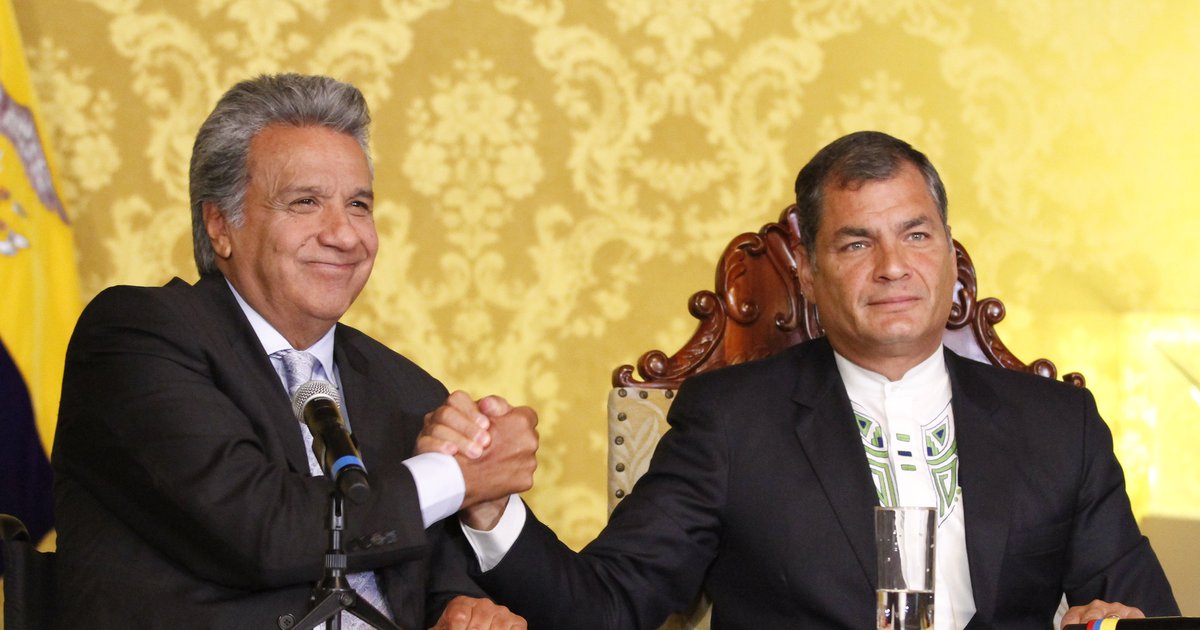Political trials and electoral bans: the battle for democracy in Ecuador

In June 2020, Correa announced his intention to run for vice president in the upcoming elections. Correa’s presence on the electoral ticket would undeniably boost the electoral potential of his movement at the polls and pose a clear threat to Moreno and his conservative alliance. Foreseeing this, Moreno had already resolved that his safest option would be to banish Correa from Ecuadorian politics for good.
The only way to secure this was via a distinctly aggressive form of judicialization of politics or “lawfare,” inspired by the judicial targeting of political adversaries elsewhere in Latin America, as in the case against former president Lula da Silva in Brazil. In order to carry out his plan, Moreno needed a tight control over the justice system, which he achieved by slipping a proposal into the 2018 referendum granting him extraordinary powers over the judiciary.
The referendum allowed Moreno to appoint trusted, die-hard anti-correistas at the head of autonomous institutions. Once he controlled the Judiciary Council, the Constitutional Court, the Prosecutor General, and the Comptroller General, he could unleash all these institutions against his correista enemies.
There are currently no less than 25 ongoing criminal investigations against Correa. For a while, the main case against Correa was for allegedly ordering the 2012 failed kidnapping, in Colombia, of Fernando Balda, a little-known fugitive of Ecuadorian justice with ties to the criminal underworld, the far right and former Colombian president Álvaro Uribe. This case landed Correa a pretrial detention order, enough for Correa to be effectively barred from returning to Ecuador.
This ruling provided great temporary relief for Moreno and his allies. But in August 2020, the chief witness in the case, an Ecuadorian police sergeant who had been instrumental in the accusations against Correa, sought refuge in Argentina where he announced that he had been threatened with a nine-year jail sentence if he refused to testify against Correa.
Fortunately for Moreno, another criminal investigation against Correa, this time on corruption charges, had landed the regime the long-awaited result it had been hoping for. In April 2020, Correa was sentenced to eight years in prison and stripped of his political rights for 25 years.
The prosecution’s case against Correa has mostly relied on the testimony of Pamela Martínez, a former advisor to Correa, who claims to have accepted money from businessmen in 2013 and 2014 with Correa’s knowledge.
A notebook emerged in which Martínez details the sums of money she says she received. The notebook is written in the present tense, but it was soon revealed that it was physically printed in 2018, some four years after the alleged events took place. Martínez now claims she wrote the notebook’s content “on impulse,” on a 45-minute flight from Quito to Guayaquil in 2018. It is thus from memory that Martínez alleges to have included entries like: “Today I received Alexis Mera in my office (…) I have asked for a meeting with the president to tell him about Alexis’s request”; and “vice president tells me to receive envelope and hand it over IMMEDIATELY…”; with, below, the word “delivered” scribbled in diagonal, as though checking the task once accomplished.
Her precise accounting of funds received is also a tribute to Martínez’s impressive ability to remember, four years later, amounts to the exact cent. One entry is for “13,306.88” US dollars.
Nevertheless, the court admitted the notebook as a key piece of evidence. Correa was found guilty ― in the absence of any demonstrable involvement with the alleged crimes ― of “psychic influence” over a group of public officials to commit acts of corruption.
Correa’s lawyers appealed the sentence. For a while, the government feared that Correa’s appeal would not be exhausted by September 17, the day on which parties can start registering their candidates for the February 2021 elections; the candidates are then granted immunity from prosecution until after the elections.
To bar Correa from running, the appeals process ― which typically may drag on for months ― would have to be significantly accelerated. But even in the context of a pandemic that has forced the Ecuadorian judiciary to virtually shut down and postpone all nonurgent hearings, Correa’s appeal soon broke records of expediency. Whereas it took four years for former Ecuadorian president Jamil Mahuad’s appeal to be heard in a court of cassation, a mere 17 days elapsed between Correa’s appeal, the cassation hearing, and the final ruling served in writing. These judges, all appointed during Moreno’s intervention of the judiciary, unsurprisingly upheld the April verdict.
Correa currently resides in Belgium, his wife’s home country, and Interpol, in its attempts to stay clear of politically motivated cases, has repeatedly denied Ecuador’s requests for the issuance of a red notice against him. Ultimately, this matters little to the anti-correista alliance. While many may relish the sight of Correa in jail, even if it would most likely generate a political backlash detrimental to their interests, the guilty verdict’s true purpose is to damage Correa’s legacy, prevent him from being physically present in the country, and bar him from running in elections.
The regime’s other line of attack has been to undermine the organizational strength of correismo. The purpose is to prevent Correa and his supporters from having a coherent and functioning political party. Back in 2017, Moreno successfully stripped Correa of Alianza País, the party Correa had created in 2006 in his first successful bid for the presidency. As Correa’s former vice president, Moreno knew that in order to wage an effective campaign against Correa and his legacy, he needed to neutralize Correa’s movement.
tinyurlis.gdu.nuclck.ruulvis.netshrtco.de
